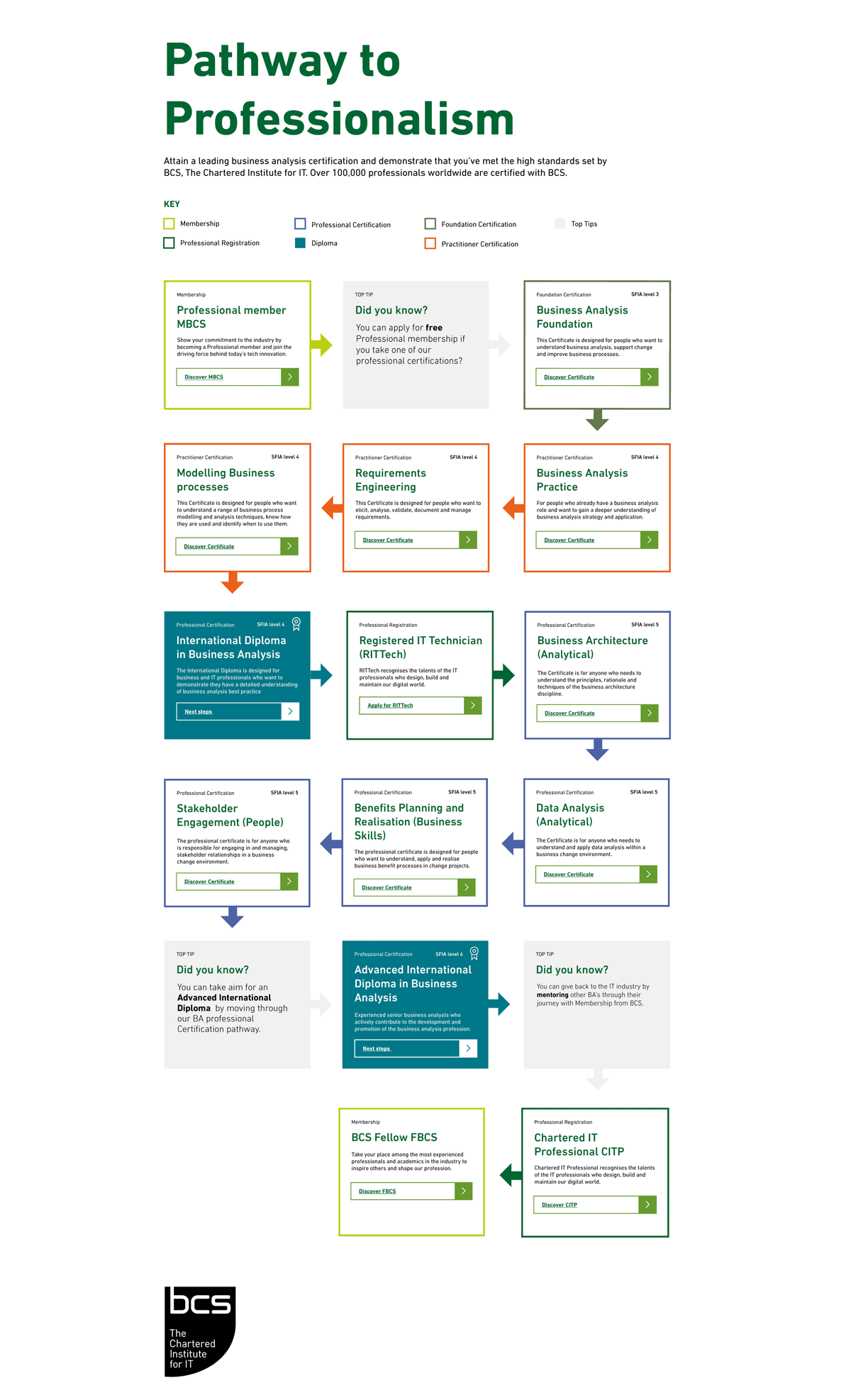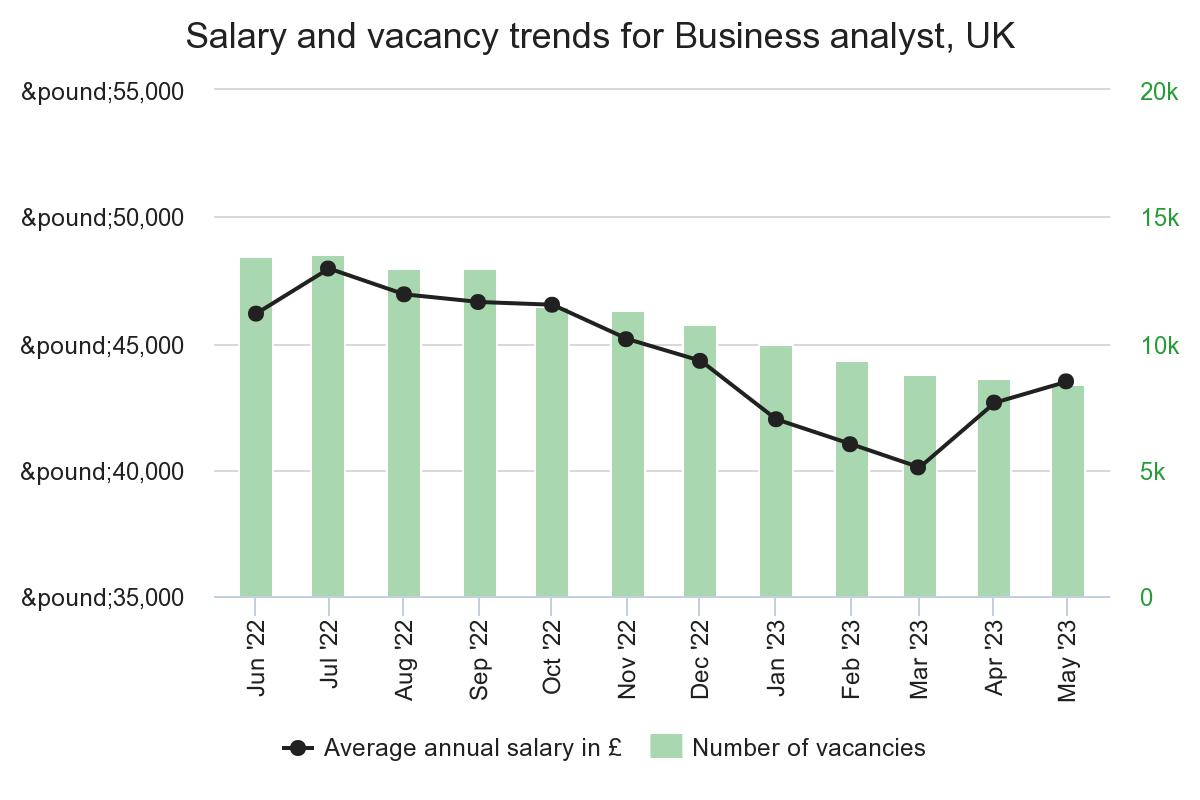The business analyst career path offers a diverse range of opportunities for professionals who are passionate about data analysis, problem-solving, and driving organisational success. Business analysts play a crucial role in understanding business needs, identifying areas for improvement, and implementing effective solutions.
In this guide, we will explore the different stages of a business analyst's career path, from entry-level positions to senior leadership roles. We will also delve into the education and certifications in business, skills, salaries, and job outlook for business analysts.
What is a Business Analyst?
Business analysts are professionals who bridge the gap between business objectives and technology solutions. They analyse data, identify trends and patterns, and provide valuable insights to support decision-making processes within an organisation.
Business analysts work closely with stakeholders in project management roles, including clients, project managers, and technical teams, to gather requirements, define project scope, and ensure successful project outcomes. They apply their education, skills, and experience to drive business improvements, enhance operational efficiency, and enable effective decision-making.
The field encompasses various job titles and business analyst roles, each with its own specialisation and focus. Some common types of business analysts include:
Management Analyst
These analysts focus on organisational efficiency, identifying areas for improvement, and recommending strategies for streamlining operations.
Data Analyst
Data analysts specialise in collecting, analysing, and interpreting data to provide insights that inform business decisions, particularly in the field of information technology.
Enterprise Analyst
Enterprise analysts work at a strategic level, analysing the organisation as a whole and aligning business processes with long-term goals.
Business Systems Analyst
These analysts focus on analysing and improving information systems within an organisation, ensuring they meet business requirements.
Systems Analyst
Systems analysts evaluate existing systems, identify areas for improvement, and propose solutions to enhance efficiency and effectiveness.
Business Intelligence Analyst
Business intelligence analysts specialise in analysing complex data sets to identify trends, patterns, and opportunities for business growth.
Business Process Analyst
These analysts focus on studying and improving business processes, identifying bottlenecks, and suggesting process optimisation strategies.
IT Business Analyst
IT business analysts bridge the gap between business and technology, ensuring that IT solutions align with business objectives and requirements.
Product Manager
Product managers analyse market trends, customer needs, and business goals to develop and manage successful products or services.
Data Scientist
Data scientists apply advanced analytical techniques and statistical models to extract insights and develop predictive models from large datasets.
These job titles represent different areas of expertise within the field of business analysis, allowing professionals to specialise in their areas of interest and passion.
Career Path for Business Analysts
The career path for a business analyst typically involves several stages of progression, each offering new challenges, responsibilities, and opportunities for growth. Let's explore the different stages of a business analyst's career path:
Junior Business Analyst
A junior business analyst is typically an entry-level position that provides an opportunity to gain hands-on experience in the field. Junior analysts work closely with colleagues and stakeholders to investigate and model business functions, processes, information flows, and data structures. They utilise a range of business analysis techniques to support the identification of operational issues, problems, and new opportunities. Junior business analysts often have 0-2 years of work experience and earn an average salary range of £57,000 to £84,000. They possess foundational skills and may hold a foundation-level certification, such as the BCS courses Foundation Certificate in Business Analysis.
Business Analyst
As a business analyst, professionals take on more responsibilities and play a key role in identifying and addressing business challenges. They work closely with colleagues and stakeholders to investigate operational issues, problems, and new opportunities, seeking effective business solutions through improvements in various aspects of business areas or systems. Business analysts at this stage typically have 4-5 years of experience and earn an average salary of around £50,000. They possess a deeper understanding of business analysis techniques, tools, and frameworks. Additionally, they may hold certifications such as the Certified Business Analysis Professional (CBAP) or similar industry-recognised credentials.
Senior Business Analyst
Senior business analysts have gained significant experience and expertise in the field. They work closely with colleagues and stakeholders to investigate and model complex business functions, processes, information flows, and data structures. Their responsibilities may include leading projects, mentoring junior analysts, and providing strategic guidance to stakeholders. Senior business analysts typically have 6-8 years of experience and earn an average salary of around £63,750. They possess advanced skills in business analysis methodologies, stakeholder management, and problem-solving. Certifications such as the Advanced Diploma in Business Analysis or similar advanced-level credentials are often held by senior business analysts.
Lead Business Analyst
As a lead business analyst, professionals take on leadership roles and are responsible for driving business analysis activities within an organisation. They possess strong planning, communication, and presentation skills and have in-depth practical knowledge of project or program management methodologies, tools, and techniques. Lead business analysts are experts in their domain and provide guidance and support to the business analysis team.
With 8-10 years of experience, lead business analysts earn an average salary of around £65,000. They may hold certifications such as the IIBA Certified Business Analysis Thought Leader (CBATL) or equivalent certifications that demonstrate their leadership capabilities. It's important to note that the career path of a business analyst may not always follow a linear progression, and individuals may have different experiences and opportunities based on their skills, interests, and industry. However, these stages provide a general framework for understanding the typical progression in the field.

Business Analyst Certifications
Professional certifications can play a vital role in advancing a business analyst's career and validating their skills and expertise. Some of the popular certifications in the field of business analysis include:
Certified Analytics Professional (CAP)
This certification demonstrates high-level skills in understanding business problems, methodology selection, model building, lifecycle management, analytics problem-solving, and data usage.
IIBA Entry Certificate in Business Analysis (ECBA)
Designed for entry-level analysts, this certification validates foundational skills in business analysis and adherence to the Business Analysis Body of Knowledge (BABOK) Guide.
IIBA Certified Business Analysis Professional (CBAP)
Intended for mid- to senior-level analysts, this certification showcases a high level of knowledge and expertise in business analysis.
IQBBA Certified Foundation Level Business Analyst (CFLBA)
This certification demonstrates competencies in modelling, analysis of requirements, designing business solutions, and knowledge of rules and standards of business analysis.
PMI Professional in Business Analysis (PBA)
Offered by the Project Management Institute, this certification illustrates expertise in business analysis and project management.
BCS International Diploma in Business Analysis
The BCS International Diploma in Business Analysis is a top certification program for professionals in the field. It validates expertise in analysing business needs and finding effective solutions.
Skills of a Business Analyst
Successful business analysts possess a combination of technical, analytical, and soft skills. Some essential skills for business analysts include:
Soft Skills for Business Analysts
Analytical Thinking
Business analysts need to have strong analytical skills to dissect complex problems, gather relevant data, and draw meaningful insights from the information available.
Communication Skills
Effective communication is crucial for business analysts to interact with stakeholders, understand their requirements, and present their findings in a clear and concise manner. They should be able to articulate complex concepts in a way that is easily understandable to both technical and non-technical audiences.
Negotiation Skills
Business analysts often need to facilitate discussions and negotiations between different stakeholders with conflicting interests. Having good negotiation skills allows them to find common ground and reach mutually beneficial agreements.
Critical Thinking
Business analysts must think critically to evaluate different options, assess risks, and identify the most appropriate solutions to address business challenges. They need to be able to analyse information objectively and make informed decisions.
Problem-Solving
Business analysts are problem solvers at their core. They need to be able to identify problems, analyse root causes, and propose effective solutions that align with business objectives and constraints.
Attention to Detail
Paying close attention to details is essential for business analysts as they need to ensure accuracy and completeness in their analysis. They should be thorough in gathering and validating data to ensure the reliability of their findings.
Organisation
Business analysts often work on multiple projects simultaneously, managing various tasks and deadlines. Being well-organised helps them prioritise activities, stay on track, and deliver results efficiently.
Curiosity
Curiosity drives business analysts to continuously learn and explore new concepts, technologies, and industry trends. It enables them to stay updated with emerging practices and innovative solutions.

Technical Skills for Business Analysts
Data Analysis and Visualisation
Proficiency in data analysis tools and techniques, such as SQL, Excel, R, Python, and statistical software like SAS or SPSS, is crucial for business analysts. They should be able to collect, clean, analyse, and visualise data to derive meaningful insights and support decision-making processes.
Business Process Modeling
Business analysts often create process models and diagrams to document current and future state processes. Familiarity with process modelling notations like BPMN (Business Process Model and Notation) or UML (Unified Modeling Language) is beneficial.
Requirements Elicitation and Management
Business analysts are responsible for gathering requirements from stakeholders and documenting them accurately. They should be skilled in techniques such as interviews, workshops, and brainstorming sessions to elicit requirements effectively.
Domain Knowledge
Having a good understanding of the industry or domain in which the business analyst operates is valuable. It helps them comprehend the specific challenges, trends, regulations, and best practices relevant to that industry.
Agile Methodologies
Agile methodologies, such as Scrum or Kanban, are widely used in software development projects. Familiarity with these methodologies and their associated tools and techniques enables business analysts to work effectively in agile environments.
Business Intelligence Tools
Business analysts may need to work with information technology tools like Tableau, Power BI, or QlikView to create interactive dashboards and reports for data visualisation and business insights.
Business Analyst Salaries
Salaries for business analysts can vary based on factors such as location, industry, experience, and specialisation. According to the latest data from the Robert Half 2021 Salary Guide, the salary range for business analysts in the UK is typically between £40,000 to £70,000 per year.
For example, junior business analysts with 1-3 years of experience can expect an average salary of £32,500 per year. As they gain more experience and move up to the role of a senior business analyst with 4-5 years of experience, the average salary range can increase to approximately £50,000.
Senior business analysts with 6-8 years of experience can earn an average salary range of £63,750. At this level, they are expected to have a deeper understanding of business functions, processes, and data analysis techniques. They may also take on more leadership responsibilities and collaborate closely with stakeholders to drive business improvements. For highly experienced business analysts who reach the position of lead business analyst with 8-10 years of experience, the average salary range can be around £65,000. As lead business analysts, they possess strong planning, communication, and presentation skills, along with in-depth knowledge of project or program management methodologies.
It's important to note that these salary ranges are approximate and can vary based on factors such as the industry, location, company size, and individual qualifications.
Job Outlook for Business Analysts
The job outlook for business analysts is promising, as organisations across various industries increasingly recognise the value of data-driven decision-making. According to the U.S. Bureau of Labor Statistics, the role of management analysts, which includes business analysts, is expected to grow by 11% between 2021 and 2031, which is much faster than the average for all occupations.
As businesses continue to face complex challenges and seek opportunities for growth and efficiency, the demand for skilled business analysts is expected to remain strong. Companies are looking for professionals who can effectively analyse data, identify business needs, and provide strategic insights to drive organisational success.
Furthermore, job prospects are not limited to traditional business analyst roles. The skills and knowledge gained as a business analyst can also open doors to other related positions such as data analysts, product managers, or even executive-level roles within companies.
The career path of a business analyst offers exciting opportunities for individuals with a passion for problem-solving, data analysis, and strategic thinking. Starting as junior business analysts, professionals can progress through the ranks, gaining experience, expertise, and leadership skills.
By acquiring the necessary education, certifications, and technical skills, business analysts can position themselves for success in this dynamic field. Soft skills such as analytical thinking, communication, and problem-solving are equally important for business analysts to effectively collaborate with stakeholders and drive positive change within organisations.
With a positive job outlook and competitive salaries, the business analyst career path presents a rewarding journey for those who are interested in making a significant impact on business operations and decision-making processes.
Whether you are just starting your career or looking to advance as a seasoned business analyst, investing in continuous learning, professional development, and certifications in business can enhance your expertise and open doors to exciting opportunities in this evolving field.

